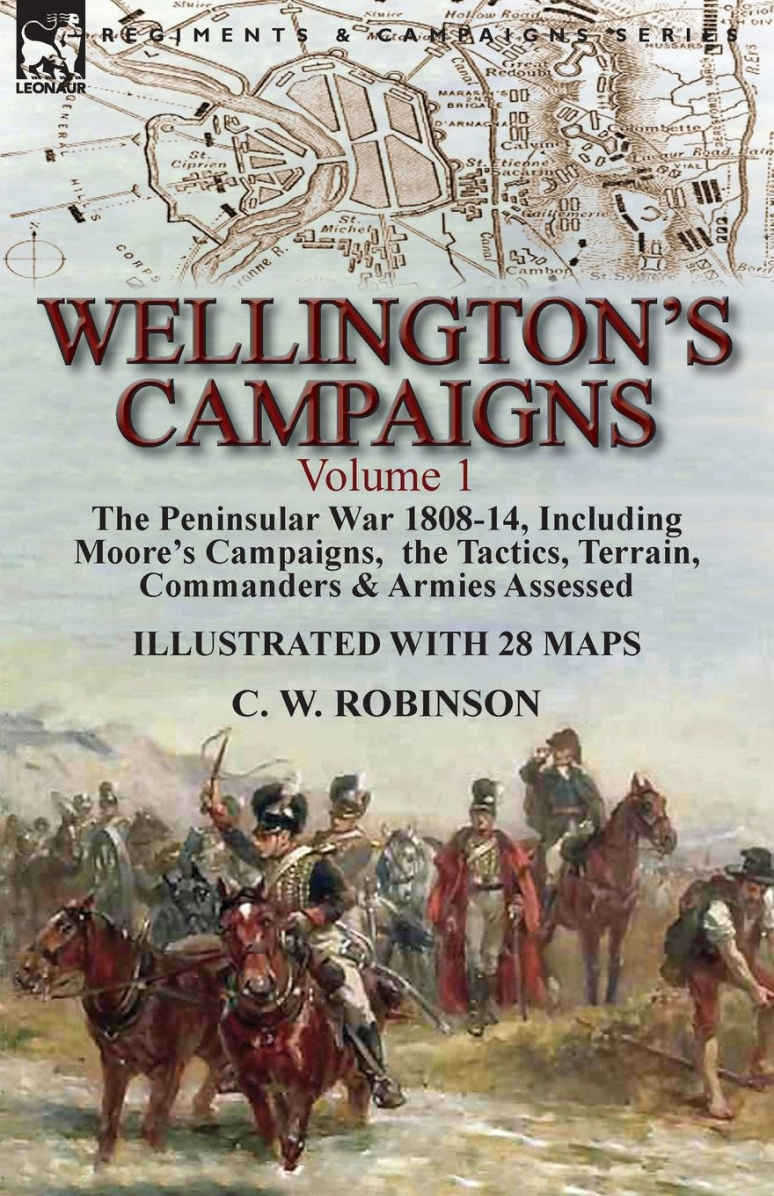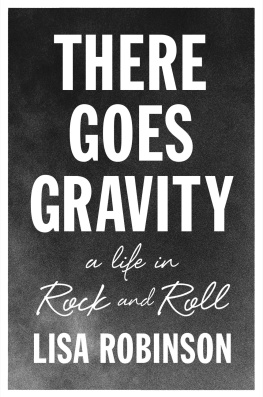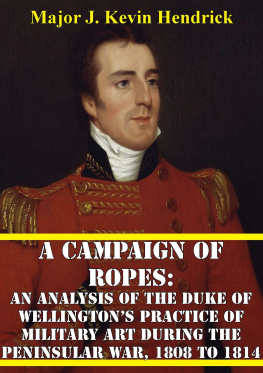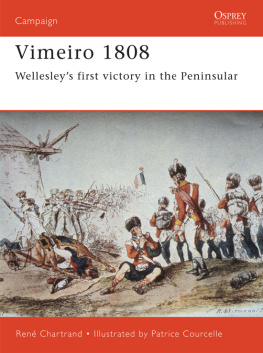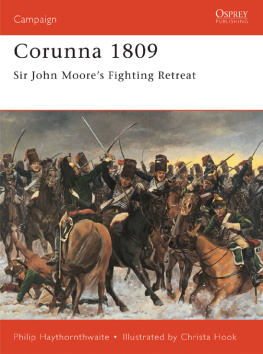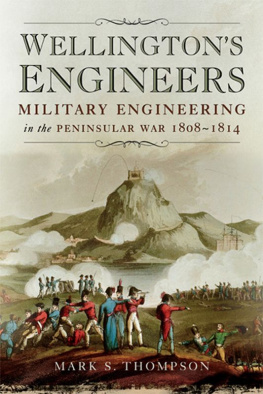Table of Contents
WELLINGTONS CAMPAIGNS
VOLUME 1
THE PENINSULAR WAR 1808-14
INCLUDING MOORES CAMPAIGNS
Wellingtons Campaigns Volume 1
The Waterloo Campaign, 1815
The Tactics, Terrain, Commanders and Armies Assessed
Illustrated with 28 Maps
by C. W. Robinson
First published under the Title
Wellingtons Campaigns 1808-15
Leonaur is an imprint of Oakpast Ltd
Copyright in this form 2017 Oakpast Ltd
ISBN: 978-1-78282-590-6 (hardcover)
ISBN: 978-1-78282-591-3 (softcover)
http://www.leonaur.com
Publishers Notes
The views expressed in this book are not necessarily those of the publisher.
Introduction
The object of these pages, based, as far as the Peninsular War is concerned, upon lectures given at the Royal Military College, Sandhurst, in past years, subsequently revised and published, after visits to some of the battlefields, under the title of Strategy of the Peninsular War , 1808-14, is to bring together from the larger standard histories of the Peninsular and Waterloo campaigns, a concise military account of the main British operations (with any necessary reference to Spanish ones affecting them), such as will not only explain these to the general reader, but also be adapted to the wants of military students.
Certain simple principles of war, with an explanation of how these and the topography of a country influence the operations of modern armies, and affected those in the Peninsula, are in chapter 2.
Full military comments upon all the movements are given, which in brief histories and epitomes of the war are sometimes little entered into, and occasionally find no place; but it has been borne in mind that there is no advantage in clothing these in too technical language, and that in comments it is wise to keep mainly to what has been said by critics who have the right to speak from knowledge and experience, especially the experience of war.
War is not an exact science. Unforeseen occurrences, and public interests other than military, frequently fetter every leader, for he is not only often compelled to act as he best can under surrounding circumstances, and not as he would choose, but must conform, if he is loyal, to the instructions of his government and to the spirit of its policy. To decide justly, by mathematical diagrams and general rules, what he should have done, is not possible; and I may add here that these pages are drawn up upon the general principle that what is learnt by following a few important campaigns throughout, and examining the lessons they convey, remains, in all probability, more fixed upon the mind than what is acquired by first studying maxims of war, and then their illustrations, taken from detached incidents in very many campaigns.
With respect to battles, I have given briefly their distinctive character, adding outline sketches of the ground. To enter, except in a few special cases, into the part borne in them by particular divisions, brigades, and regiments, or to discuss the handling in combination of the three armsmatters which pertain to the very large subject of tacticswould be to attempt to do, and to do imperfectly, what, in its nature, is beyond the scope of this book.
******
It is usual to speak of the three armsartillery, cavalry, and infantrybut there is practically a fourth, the Engineers, who, under Wellingtons general instructions, planned, traced, and supervised the famous lines of Torres Vedras in 1809-10, and were active throughout these campaigns.
******
Any exhaustive examination into the details of Wellingtons battles and sieges, from Roleia to Toulouse, would fill, not one volume, but several.
As a preparation, though, for such an examination, I have given the object with which each battle was fought; the chief commanders, and (in round numbers) the forces on each side; the general character of the positions taken up; the main features of the battle; its results; and the chief lessons taught by it, mentioning also the approximate losses suffered, and, as of interest, the medals, clasps, or battle-honours awarded for it.
In the battle plans, while the aim is to keep them clear, a few more places, and other particulars, are sometimes inserted than may be essential to illustrate the text, in order to render them of further use to those reading about these battles in more detailed histories. (Whenever it has been seen that maps in standard works upon the war differ, as they sometimes do, upon any point, reference has been made to the official Spanish and French surveys).
The campaigns of Wellington teach students some valuable lessons, which those between the armies of Continental nations cannot equally impart, because the former give the experience of British leaders, commanding British troops, carrying on war under a British military system and form of government, and yet usually in co-operation with other powers, whose troops are not bound by the same conditions. They illustrate, in short, the circumstances and special difficulties which will almost always surround British officers in any European war in which they may be engaged.
They have contributed to raise the prestige and fame of British arms, and strengthen the Empire; and they teach the value of sea-power, and a close accord between the navy and the army.
For these reasons, they appear to form the best foundation for the study of military history by British officers and students. But, further than this, they were conducted by great captains, under conditions which, not forgetting the advance of modern science, are still, with certain reservations, those of our own day.
All authorities of note, though differing in their view as to how far back soldiers should go in military history in order to gather from the past lessons applicable to the present, seem agreed in this, that from the period when the conditions of war compelled all organised armies to protect a long line of suppliesin other words, from the days of Wellington and Napoleonthe principles of moving armies, when beyond the range of modern weapons, have little, if at all, altered, though the manner of applying these principles may be different.
To illustrate what is meant:
In the days of Wellington and Napoleon it was an accepted principle of war to carefully guard the line of communications i.e . the line along which the army communicates with its sources of supply (of stores, men, etc.), Another was to threaten the enemys when possible, (see chapter 2). Napoleon wrote, in his Maximes de guerre :
The most important secret in war is to make oneself master of the communications... One ought never to yield up ones line of communication; but to know how to change it is one of the most skilful manoeuvres of the art of war.
Now the above principles are as applicable today as when they were written; indeed, they become, as armies increase in size and require more munitions of war to render them efficient, more vitally applicable. We see commanders in modern wars, including those of the forces of Japan and Russia in Manchuria, recognising their truth and acting upon them, but we find no more clear and striking illustrations of their value than in the campaigns of Wellington and Moore. Moore, by his advance against Napoleons communications in the campaign of Corunna in 1808, entirely altered the course of the war and frustrated Napoleons plans; and by his change of communications from Lisbon to Corunna withdrew his army from the dangers which surrounded it. Wellington changed his own line of communication from Portugal to St. Ander, in the north of Spain, in 1813; and then, at Vittoria, paralyzed Josephs army by seizing his line (through Bayonne), and capturing all his guns, stores, and treasure.

